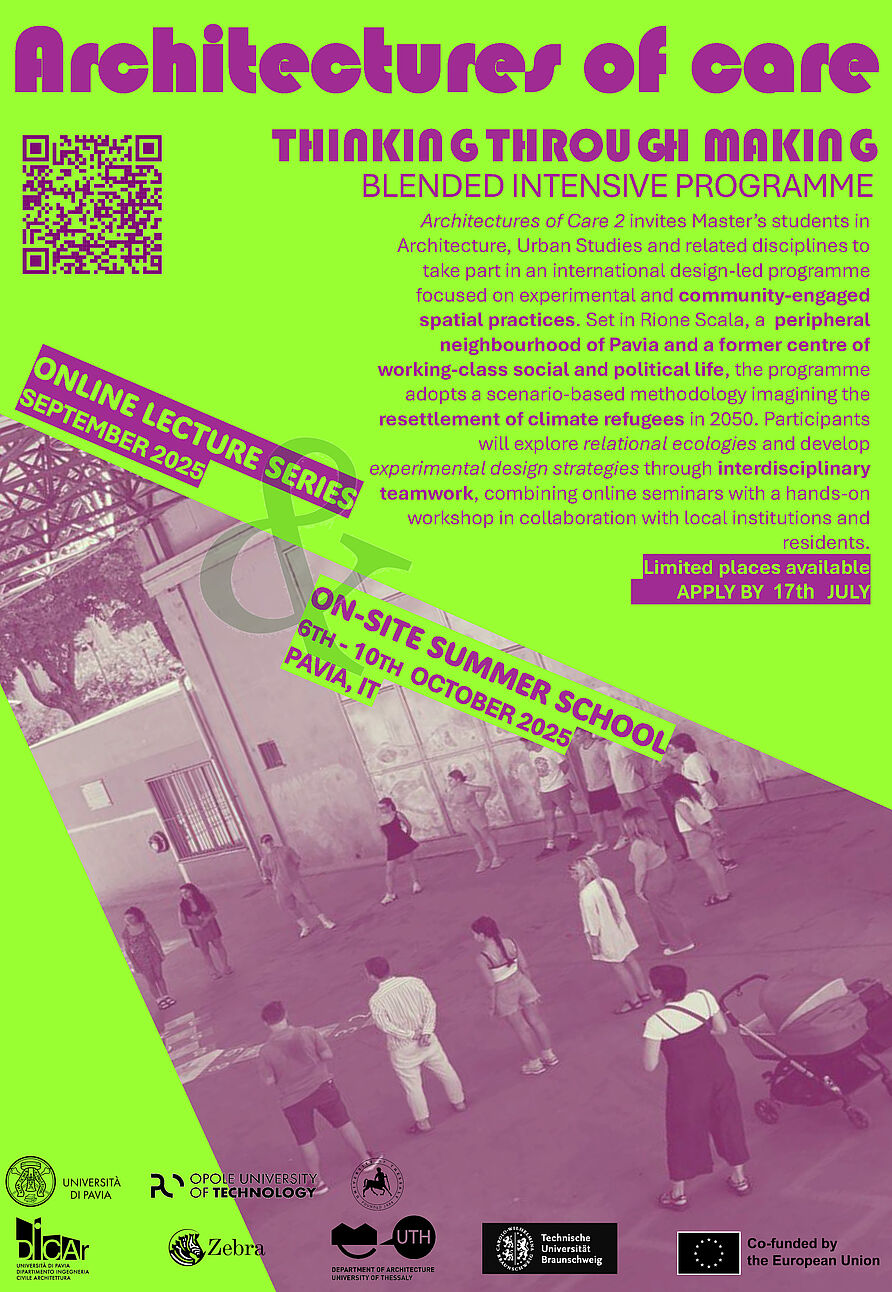In Kooperation mit der Università di Pavia (Italien), sowie Partnern aus Griechenland und Polen, bieten wir 5 Plätze im Rahmen eines Blended Intensive Programs (BIP) mit Online Vorträgen im September und On-Site Summerschool in Pavia vom 6.-10. Oktober 2025.
Für die Teilnahme an BIP und Summerschool werden 3 ETCS Punkte vergeben welche im Bereich SQ/Professionalisierung angerechnet werden können. BIP Input sowie Betreuung vor Ort in Pavia durch Internationale Koordination Architektur und GTAS. Finanzierung durch Erasmusstipendien für den Auslandsauftenhalt ist (unter Vorbehalt) möglich.
Studierende die sich für einen der fünf Plätze bewerben wollen senden bitte bis zum 17.Juli 2025 ein Motivationsschreiben, welches Summerschoolthema (siehe unten) und eigene Interessen und Erfahrung in Beziehung setzt (1 A4 Seite) an florian.kossak(at)tu-braunschweig.de
Summerschool Thema:
Architectures of Care 2: Thinking Through Making represents the second edition of the Architectures of Care Summer School, aimed at developing context-specific design solutions for the Rione Scala neighbourhood in Pavia. Building on the 2024 edition, the programme targets master's students and doctoral candidates featuring an interdisciplinary approach integrating architectural design, technology and community-based practices.
In collaboration with international partners and a consolidated local network—including the Municipality of Pavia, Calypso Teatro Sociale, Biblioteca Mirabello Scala, CSV Lombardia Sud, ARCI Provincia di Pavia, and the Rete Comitati per Pavia—the initiative fosters territorial collaboration. The programme blends online preparatory seminars with an intensive five-day in-person workshop. Participants will work in international teams, guided by expert tutors, to develop design proposals addressing public spaces and residential areas through participatory and action-research methodologies.
The Summer School will welcome 20 international students from partner universities and five from the University of Pavia, selected based on academic merit and thematic relevance. The programme promotes an inclusive learning environment, valuing cultural diversity and fostering the exchange of perspectives.
The innovative model closely integrates teaching, research, and community collaboration, transforming Rione Scala into a laboratory for experimental design. The Performative Site Survey, inspired by the first edition’s Performing Futures workshop (photo below), immerses participants in the neighbourhood through observation, interaction, and performative practices, fostering group cohesion and critical spatial understanding.
The dynamic educational model alternates between classroom sessions and field activities, testing design solutions in real contexts. Local partners facilitate interaction with residents, strengthening the dialogue between the university and the community. International faculty from University of Thessaly (Greece) and contribute regeneration, and public space management. Opole University of Technology (Poland) specialised knowledge in digital technologies, urban
Co-financed by the Erasmus+ Blended Intensive Programme (BIP), the project supports international mobility and reinforces the transnational educational network. The second edition will address three macro-themes: distributed play devices, integration between domestic space and agricultural landscape, and social inclusion spaces in residential courtyards. Technology will play a pivotal role in co-design and the collective construction of experimental spatial devices.
The programme alternates theoretical teaching, field research, and design experimentation. The online preparatory phase (July 2025) includes four English-language seminars, while the in-person workshop (October 2025) combines site exploration, design, and the realisation of spatial devices.
The final exhibition will present student proposals to the community, fostering dialogue and reinforcing the relationship between academia and local stakeholders.

